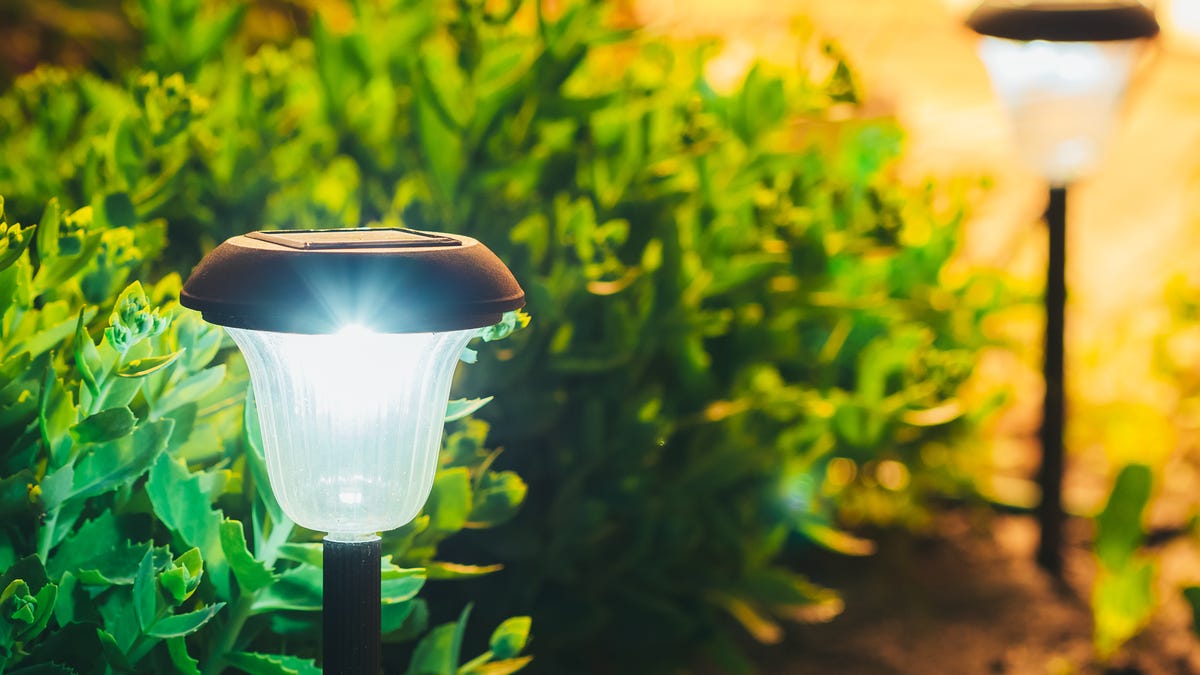Solar-Powered Lights: Conveniently Cordless, but Less Durable
These lights illuminate your yard without adding to your power bill. Here's how they work and what to know before you buy.

Small solar-powered lights can help illuminate your garden bed without having to be plugged in.
You don't have to light up your yard during the day. The sun does that. But what if the sun's energy could light up your yard again at night?
That's the appeal of solar-powered outdoor lights. They capture the sun's rays during the day to charge a battery, then run lighting off that battery when the sun goes down. It's a simple concept, but there are tradeoffs, lighting professionals told CNET.
These lights are simple to place around your yard, because you don't have to run a power cord to them. The combination of solar generation and lighting in one compact component means it's entirely self-contained, and can be moved easily.
Can solar panels save you money?
Interested in understanding the impact solar can have on your home? Enter some basic information below, and we’ll instantly provide a free estimate of your energy savings.
But there are also more components that can go bad, and the batteries often die well before the bulb would, and then you have to throw out the whole thing. They're also susceptible to the elements, namely rain, snow and ice.
"You're combining two technologies and asking them to perform under some pretty severe circumstances," said Erin McDannald, CEO of Environments by Lighting Environments, a business-to-business lighting company.
Here's what to consider if you're thinking about putting solar lights up around your home.
How do solar lights work?
Solar lights contain three basic components: a solar panel that captures solar energy and converts it to electricity; a battery that stores that electricity; and a lamp, typically an LED. They also often include a device that detects how much light is hitting the cell and, when it reaches a certain dimness, turns on the light, said Mark Jongewaard, president of LTI Optics, an optical design software company, and an instructor at the University of Colorado Boulder.
"The main advantage is the convenience of not having to run power to them," Jongewaard said.
Some lights have the solar panel, battery and lamp all contained within one piece, while others have a separate solar panel and battery pack connected to the lights by a wire.
Solar lights can be moved to different locations around your home, yard or garden without you having to move a wire, McDannald said. They're also cheaper to install because they don't require any wiring or connections.
The tradeoff is that these lights rely on all of the components to work, and that significantly shortens their lifespan compared to lights that run directly to an electrical outlet. When something breaks, it's hard or impossible to find the part to fix it, and you typically have to throw the whole thing out and replace it, McDannald said.
Pros of solar lights
- Simple to install
- Can be moved easily
- Don't use power from your home electrical system
Cons of solar lights
- Less durable
- Hard to find replacement parts
- Limited selection
What types of solar lights are available?
Solar-powered lights are available for all kinds of outdoor lighting functions, from illuminating your sidewalk to creating Instagram-worthy backdrops for your deck. Here are a few examples of what's out there.
Path lights
Path lights offer an easy-to-install way to light up your sidewalk or other pathway. These lights typically require little more than being pushed into the ground with maybe a little digging beforehand.
CNET's pick for best outdoor smart lights, the Ring Pathlights have built-in motion sensors that can turn on a light or a group of lights when someone passes by and trigger your Ring cameras also. Read more about the Ring Pathlight.
Flood lights
Often equipped with motion sensors, flood lights give you the ability to illuminate a large area quickly. Install them over your back door or garage door and you'll be able to investigate strange noises in the night quickly.
The Arlo Pro 3 Floodlight Camera, CNET's pick for the best floodlight camera on the market, is by default powered by a battery, not by a solar panel. But you can buy a solar panel charger for its battery, meaning it doesn't have to be plugged in and doesn't have to rely on you to recharge it.
String lights
String lights, which include fairy lights, range from the practical to the purely decorative. Some have large bulbs and put out a lot of light, while others are more akin to colorful holiday lights.
These solar string lights differ from most solar-powered string lights in that they come with a manual switch to turn them on or off at your discretion, not just when it gets dark. They also have batteries that are rechargeable and replaceable.
How to choose the best solar lights for your home
The first step is to decide if the lights you're installing need to be solar-powered. If they're close to your home or an electrical outlet, an old-fashioned plug-in light might be a better choice. "The best way to do it is to plug in if you can," McDannald said.
With any lights, you need to consider how bright and what color you want them to be. Jongewaard said he prefers warmer colors, which offer a softer, more inviting light. As for brightness, consider that when you're illuminating the outdoors in the dark, you don't need as bright of a light, Jongewaard said. "They can generally work with a lower lumen output. It's hard to know what you really need until you try it and see what you like."
Solar-powered lights tend to last longer if they aren't directly exposed to water, McDannald said. "Path lights tend not to last as long if they're solar powered," she said. "They're pounded by the sun and subjected to water every day."



